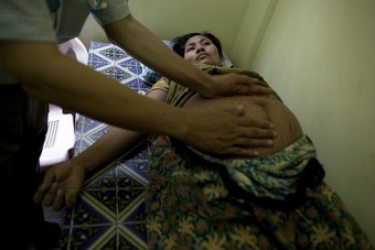Lack of Contraceptive Access: The Public Health Emergency in Eastern Burma
A report released today details how the public health emergency in eastern Burma continues to undermine the health and well being of millions of people affected by decades of war. Women in eastern Burma face the worst pregnancy outcomes anywhere in Asia, and access to contraception is virtually nonexistent.
Also see Cari Siestra’s and Angel Foster’s article about unsafe abortion practices in Eastern Burma.
Though the historic ceasefire in Burma between the government and the Karen National Union (KNU) has been called into question, the nation is continuing to move rapidly through a series of astonishing changes. After 60 years of internal conflict, 651 political prisoners were released from Burma’s prisons this past month, including both convicted military leaders and prisoners of conscience. Aung San Suu Kyi, the Nobel Peace Prize-winning opposition leader formerly under house arrest is running for parliament in Rangoon. President Thein Sein is urging Western nations to remove sanctions on Burma.
But “Separated by Borders,” a report released last week from Ibis Reproductive Health and the Global Health Access Program, details how the public health emergency in eastern Burma continues to undermine the health and well being of millions of people affected by decades of war. The resulting decay of healthcare-related infrastructures and a long legacy of human rights violations—including the military’s policy of denying health care to certain ethnic groups—have all taken their toll. Burma’s maternal mortality rates now dwarf the rates in Thailand and Burma (Myanmar) as a whole, leaving women in eastern Burma with the worst pregnancy outcomes anywhere in Asia.
Access to contraception is virtually nonexistent: an estimated 80 percent of women in eastern Burma have never used birth control. This naturally results in high numbers of unplanned pregnancies. Post-partum hemorrhage and unsafe abortion are the leading cause of maternal mortality for Burmese women. Small wonder given the scarcity of hospitals, the difficulty of traveling through conflict zones, and the generally low priority given to women, period, let alone when they are pregnant.
Dr. Angel Foster, an affiliated scholar with Ibis and one of the report’s authors, is returning to the region this week to support the training of local health workers.
“Too often, those working with refugees, migrants, and cross-border populations in Thailand do not coordinate a common standard of service,” she explained. “The patchwork practice leads to misinformation among Burmese people.”
Dr. Foster offers emergency contraception as a prime example. It’s key to preventing unintended pregnancies, which is particularly important given the high rate of sexual assault in the immigrant camps along the Thai/Burma border. But some clinics only provide EC to patients if they can document that they are assault victims; others do not provide EC to teenagers, or unmarried women. “If you happen to go to one of the clinics where you don’t get it, you tell your friends about that experience, and they don’t know that other organizations will make EC available,” Dr. Foster said. “People aren’t asking for it because they don’t know it’s possible.”
Now that the European Union has lifted its ban on travel to Burma, human rights organizations will once more have the opportunity to bring first-world reproductive health care to the region. Cari Siestra, a lawyer and the report’s co-author, hopes the unprecedented information collected in “Separated by Borders” will assist the outside groups moving towards providing aid to eastern Burma. “The time has come to rebuild the health and human rights of the millions of men, women, and children affected by this conflict,” she said.
Both Foster and Sietstra believe that the reproductive health emergency must be a priority during this period of transformation. Said Foster:
“When women don’t have control over their fertility, when to have a child and how many, it limits their ability to fully participate in political life, or in wage employment, or in education opportunities.”
Sietstra adds, “Women’s autonomy is tied to their reproductive choices. If the families of eastern Burma are to return to health and wellness, women and families absolutely need to control fertility – to choose whether or not to have a child, and to have access to services that allow them to have a child safely.”

